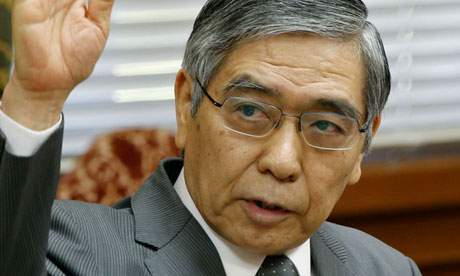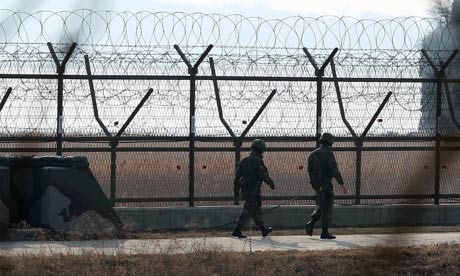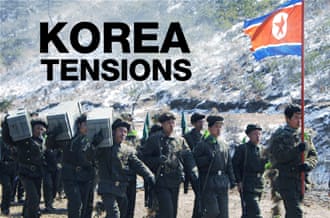http://www.zerohedge.com/news/2013-04-08/japan-bond-market-halted-second-day-row
Japan Bond Market Halted For Second Day In A Row
Submitted by Tyler Durden on 04/08/2013 00:21 -0400

http://english.yonhapnews.co.kr/northkorea/2013/04/08/74/0401000000AEN20130408009800315F.HTML

Following Friday's epic collapse, snap-back, and circuit-breaker halt in JGB Futures, it appears that investors cannot get enough of Japanese bonds today. From the JPY144.02 close, JGB Futures traded up at the open, oscillated and then gapped higher (on heavy volume) to JPY145.25 before the TSE halted trading once again (on a volatility-based circuit-breaker limit) due to 'rapid price fluctuations. The quadrillion JPY cash JGB market appears very illiquid as we scan the benchmark issues with the 30Y yield higher by 4bps, the 20Y lower by 14bps, and the 10Y lower by 3bps as it appears the futures are the weapon of choice. Since the halt ended, JGB Futures have slipped back notably. It seems pretty evident when and where the BoJ monetization took place but desk chatter was that it was poorly run.
but in contrast to Friday's epic fail this brief surge in price appears nothing...
This should give some more context for just how broken these markets are. A 5bps drop in a 50bps 10Y yield (the BoJ monetization?) followed by a 7bps rip higher!! Interesting that JPY was sold hard during the break in Cash bond trading...
So absent the BoJ's efforts today, the JGB market would have been significantly uglier.
Charts: Bloomberg
http://www.guardian.co.uk/world/2013/apr/08/yen-slumps-bank-of-japan
Yen slumps to new low as Bank of Japan unveils stimulus plan
Yen dips against major currencies after Bank of Japan buys government bonds in effort to beat deflation
Reuters

Bank of Japan governor Haruhiko Kuroda said last week it would inject about $1.4tn into the economy, a gamble that sent bond yields plummeting. Photograph: AP
The yen hit fresh lows against a host of major currencies on Monday, resuming its slide after the Bank of Japan lost no time in launching its new easing policy to underline its determination to beat deflation.
The central bank conducted its first government bond buying operations on Monday and said it will buy 1tn yen of bonds with maturities of between five and 10 years, and 200bn yen of bonds with maturities exceeding 10 years.
The dollar gained 1% to 98.54 yen after jumping more than a full yen to 98.85, its highest since June 2009, according to the EBS trading platform.
"After a big spurt in the morning, it started to stick a bit, but the possibility of it getting to 100 has increased," said Soichiro Tsutsumi, a trader at eWarrant Japan Securities KK.
Last week, new BoJ governor Haruhiko Kuroda said the central bank would inject about $1.4tn into the economy in less than two years, a gamble that sent bond yields plummeting as prices rose on expectations of massive purchases of debt by the BoJ.
Analysts assume the flood of new money will be partly used by Japanese investors to buy higher yielding assets abroad, putting downward pressure on the yen.
JPMorgan analysts wrote in a client report that they had re-initiated a basket of yen shorts and were recommending the Australian dollar and Brazilian real as carry trades against the yen after the BoJ announced its aggressive stimulus plan.
The Australian dollar was up 0.2% against the yen at 102.12 yen after rallying to 102.32 yen, its highest since July 2008.
The euro climbed as far as 128.43 yen, its highest since January 2010, before pulling back to 127.90 yen, 0.9% higher than late US levels on Friday.
Some analysts said that a flare-up in the eurozone's problems could ramp up risk aversion, prompting investors to buy "safe haven" yen and put a floor under its slide. Others said signs of cracks in the US economic recovery could weigh on the dollar.
"Getting to 100 yen against the dollar is just a matter of time …But US data has been a bit mixed and if we have more negative data, then the dollar-yen could come under pressure," said Etsuko Yamashita, chief economist at Sumitomo Mitsui Banking.
Underwhelming US payroll data out on Friday barely dented the dollar's gains against the Japanese currency as yen bears continued to celebrate the BoJ's aggressive stimulus plan.
"Kuroda's impact simply overshadowed the disappointing US data. I think the biggest obstacle for the yen will be people paying attention to the rising cost of imports and Japan's trade deficit," said Soichiro Tsutsumi, a trader at eWarrant Japan Securities.
A weakening yen has ramped up the cost of Japan's energy imports, with February's trade deficit of 777.5bn yen ($8bn) the widest on record for that month.
Since the BoJ unleashed the world's most intense burst of monetary stimulus last week, the yen has slumped more than 6% against both the dollar and euro.
"We expect further weakness ahead, given the bank's clear commitment to achieve its 2% (inflation) target," analysts at Barclays Capital said, adding they see the US dollar rising to 103 yen in three months.
With the Japanese currency still firmly in focus, the other major currencies took a backseat.
The euro slipped 0.1% against the dollar to $1.2982, hovering near a two-week high of $1.3040 set on Friday after weaker-than-expected employment growth cast a shadow on the US economic recovery picture.
With little economic data out on Monday, the downward pressure on the yen is seen as likely continuing through the day.
More strange things from Asia ....... North Korea still going bonkers !
http://www.aljazeera.com/news/asia-pacific/2013/04/2013482942256998.html
and....
http://www.businessinsider.com/north-korea-calls-for-total-evacuation-and-suspension-of-kaesong-industrial-zone-2013-4
The latest ratcheting up of tensions from North Korea: leadership has called for the complete evacuation and suspension of activities at the Kaesong industrial zone, an industrial area on the border where South Koreans and North Koreans work.
Already last week, North Korea was turning away workers from the South. Now all workers are being evacuated.
This is an unprecedented step, that doesn't fit in with past episodes of DPRK bluster.
and.....
http://english.yonhapnews.co.kr/northkorea/2013/04/08/74/0401000000AEN20130408009800315F.HTML
N. Korea to withdraw all its workers from Kaesong complex
SEOUL, April 8 (Yonhap) -- North Korea said Monday that it will withdraw all of its workers from the Kaesong Industrial Complex in response to unacceptable provocations against the country's dignity.
The statement carried by the Korean Central News Agency (KCNA) monitored in Seoul said all North Korean workers will be pulled out from the border town located just north of the demilitarized zone.
It warned follow-up measures will be implemented after reviewing actions taken by the South.
The statement carried by the Korean Central News Agency (KCNA) monitored in Seoul said all North Korean workers will be pulled out from the border town located just north of the demilitarized zone.
It warned follow-up measures will be implemented after reviewing actions taken by the South.
http://www.guardian.co.uk/world/2013/apr/08/north-korea-nuclear-test-not-imminent
North Korea fourth nuclear test not imminent, says South
Defence ministry retracts claim regime preparing for test despite reporting increased activity at siteJustin McCurry in Seoul

South Korean soldiers patrol the border with the North near Imjingak in Gyeonggi-do province. Photograph: Jeon Heon-Kyun/EPA
South Korea has retracted claims that North Korea is preparing to conduct a fourth nuclear test, hours after the unification minister in Seoul said there were signs of increased activity at the North's main testing site.
But as officials in Seoul dampened speculation over a nuclear test, North Korea said it would withdraw its workers from the Kaesong industrial zone, a venture with the South located north of the heavily armed border separating the countries.
The South's defence ministry said the reported movements around the Punggye-ri site were routine and did not signal an imminent test. "We found there had been no unusual movements that indicated it wanted to carry out a nuclear test," a defence ministry spokesman said.
Earlier on Monday, the South Korean unification minister, Ryoo Kihl-jae, was reported as having told a meeting of MPs that Seoul had acquired evidence of increased movement of vehicles and personnel at Punggye-ri.
Later the same day, a "startled" Ryoo said he has "misspoken" and could not remember making the comments, which were recorded on video. A ministry spokesman said Ryoo had meant to say that North Korea had long been prepared to conduct a nuclear test, but that there were no signs of unusual activity.
Announcing the suspension of operations at Kaesong, Kim Yang-gon, secretary of the ruling party's central committee, said the regime would suspend operations in the zone and decide whether to resume work there or close it down.
"It has become impossible to operate the zone as usual due to the South Korean warmongers' reckless acts," the official KCNA news agency quoted him as saying.
North Korea last week banned hundreds of South Korean managers from entering the complex, which earns the communist state about $86m (£56m) a year. More than 120 firms from the South employ 54,000 North Korean workers.
Analysts had expected operations at the plant to wind down because of the ban and the dwindling supply of raw materials from the South.
The nuclear testing site on North Korea's north-east coast is where the country's three previous controlled nuclear detonations – in 2006, 2009 and on 12 February this year – took place.
Ryoo's comments came after a South Korean newspaper quoted an unnamed government source as saying that workers appeared to be preparing for another test at Punggye-ri.
The JoongAng Ilbo quoted the source as saying that South Korean intelligence had detected "increased activity of labour forces and vehicles" at the site. "We are closely monitoring the ongoing situation, which is very similar to the situation ahead of the third nuclear test. We are trying to figure out whether it is a genuine preparation for a nuclear test or just a ploy to heap more pressure on us and the US," it said.
News Focus International, a website run by North Korean exiles, suggested a simple mistranslation from Korean to English might have contributed to the confusion. The nuanced meaning of the Korean word for "early symptom" or "signal", the site said, did not necessarily indicate an imminent action, but referred to moves to leave open the possibility of a nuclear test.
The prospect of a nuclear test is certain to add to tensions on the peninsula amid reports that the regime in Pyongyang could be planning to launch a medium-range missile from its east coast, possibly as early as Wednesday.
Any missile launch is expected to be a test rather than a targeted strike and could take place in the runup to the 101st anniversary of the birth of North Korea's founder, Kim Il-sung, on 15 April. Another significant date is the anniversary of the foundation of the Korean people's army 10 days later.
Last week, North Korea warned foreign embassies in Pyongyang it could not guarantee their safety from the threat of conflict after this Wednesday and advised them to consider pulling their staff out of the capital.
The North has unleashed a barrage of threats since the UN imposed sanctions in response to February's nuclear test. It has also been angered by military exercises involving South Korea and the US that are due to run to the end of the month.
The regime has threatened to launch nuclear strikes against the US mainland and its bases in the Pacific, declared itself in a "state of war" with South Korea and cut its military hotline with Seoul.
The withdrawal of workers from Kaesong and the reported deployment of missiles are being seen as an attempt to raise fears of an impending crisis in the hope of winning concessions from Washington. There are no signs that the regime is mobilising its army of 1.2 million in preparation for any sort of attack.
The chairman of the US joint chiefs of staff, General Martin Dempsey, said he did not believe the North would take military action, but added: "I can't take the chance that it won't."
The US has brought forward the deployment of a missile defence system to Guam, a US territory in the Pacific. It has drawn up plans with South Korea on how to respond to specific military provocations by the North.
The allies would "respond more forcefully than in the recent past but in a limited way intended to prevent an escalation to broader war", the New York Times said, citing Pentagon officials.
A nuclear test would anger China, which has shown signs of growing frustration with North Korea, a major recipient of Chinese aid.
The Chinese president, Xi Jinping, alluded to North Korean provocations when he said no country "should be allowed to throw a region and even the whole world into chaos for selfish gain" in a speech on Sunday.
In a telephone conversation with the UN secretary general, Ban Ki-moon, at the weekend, China's foreign minister, Wang Yi, said Beijing "opposes provocative words and actions from any party in the region and do not allow troublemaking on China's doorstep", according to the ministry's website.
The commander of the 28,000 US troops based in South Korea, General James Thurman, abruptly cancelled a visit to Washington where he had been due to testify before congressional committees. Thurman would remain in Seoul as a "prudent measure", according to a US military official quoted by Associated Press.
The chairman of South Korea's joint chiefs of staff, General Jung Seung-jo, also cancelled a visit to Washington later this week in light of rising tensions at home.
Dan Pfeiffer, an adviser to US president Barack Obama, said the administration would not be surprised if the North conducted a missile test or similar provocation.
Pfeiffer told ABC's This Week the North should "stop their actions, start meeting their international obligations and put themselves in a position where they can achieve what is their stated goal, which is economic development, which will only happen if they rejoin the international community".









No comments:
Post a Comment